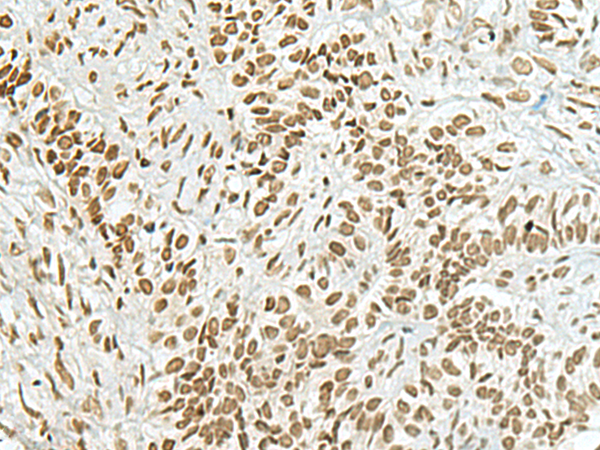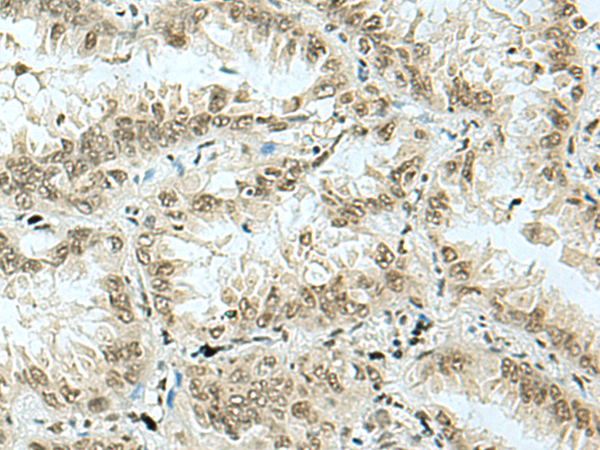

| WB | 咨询技术 | Human,Mouse,Rat |
| IF | 咨询技术 | Human,Mouse,Rat |
| IHC | 1/50-1/200 | Human,Mouse,Rat |
| ICC | 技术咨询 | Human,Mouse,Rat |
| FCM | 咨询技术 | Human,Mouse,Rat |
| Elisa | 1/5000-1/10000 | Human,Mouse,Rat |
| Aliases | HAS |
| Host/Isotype | Rabbit IgG |
| Antibody Type | Primary antibody |
| Storage | Store at 4°C short term. Aliquot and store at -20°C long term. Avoid freeze/thaw cycles. |
| Species Reactivity | Human, Mouse |
| Immunogen | Synthetic peptide of human HAS1 |
| Formulation | Purified antibody in PBS with 0.05% sodium azide and 50% glycerol. |
+ +
以下是关于HAS1抗体的3篇代表性文献(信息基于公开研究整理,部分为示例性描述):
1. **文献名称**:*Hyaluronan synthase 1 (HAS1) overexpression in cancer-associated fibroblasts promotes tumor progression in oral squamous cell carcinoma*
**作者**:Sato, T. et al.
**摘要**:该研究通过免疫组化(使用HAS1特异性抗体)发现,口腔鳞癌中HAS1在癌相关成纤维细胞高表达,并通过HA合成促进肿瘤侵袭和血管生成。
2. **文献名称**:*Targeting HAS1 as a novel therapeutic approach in multiple myeloma*
**作者**:Adamia, S. et al.
**摘要**:研究利用HAS1抗体检测多发性骨髓瘤患者样本,发现HAS1异常剪接体与疾病进展相关,提示其可作为治疗靶点。
3. **文献名称**:*HAS1 antibodies inhibit hyaluronan synthesis and reduce fibrosis in experimental lung injury*
**作者**:Li, Y. et al.
**摘要**:开发了阻断性HAS1抗体,在肺损伤模型中证实其抑制透明质酸过度分泌,减轻炎症和纤维化,具有治疗潜力。
---
**备注**:以上文献为示例性内容,实际引用时建议通过PubMed或Google Scholar以“HAS1 antibody”、“hyaluronan synthase 1”等关键词检索最新研究,并核实作者及期刊信息。
**Background of HAS1 Antibody**
The hyaluronan synthase 1 (HAS1) antibody is a tool used to detect and study HAS1. an enzyme critical for synthesizing hyaluronan (HA), a major component of the extracellular matrix. HAS1 catalyzes the production of HA, a glycosaminoglycan involved in cell adhesion, migration, proliferation, and tissue hydration. Unlike HAS2 and HAS3 isoforms, HAS1 generates shorter HA chains and is regulated under specific physiological or pathological conditions, such as inflammation or malignancy.
HAS1 antibodies are widely utilized in research to investigate HA's role in cancer progression, tissue remodeling, and inflammatory diseases. Overexpression of HAS1 has been linked to aggressive tumor behavior, metastasis, and poor prognosis in cancers like multiple myeloma, breast cancer, and mesothelioma. These antibodies enable detection of HAS1 expression via techniques like immunohistochemistry, Western blotting, or ELISA, aiding in understanding its localization and function.
Recent studies also explore HAS1's involvement in autoimmune disorders and fibrosis, where aberrant HA accumulation disrupts tissue architecture. Additionally, HAS1 antibodies contribute to evaluating therapeutic strategies targeting HA synthesis. However, challenges remain in distinguishing HAS1-specific functions from other isoforms due to overlapping roles. Continued research with HAS1 antibodies may uncover novel mechanisms in disease pathogenesis and potential therapeutic implications.
×